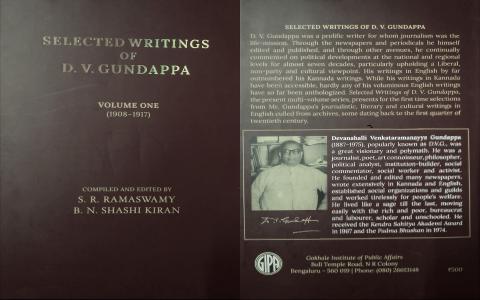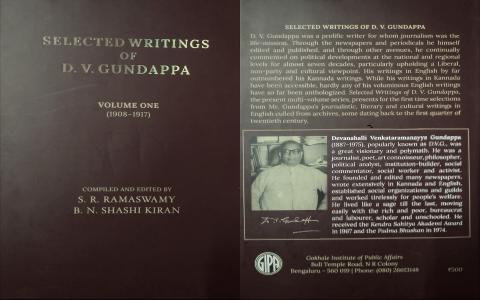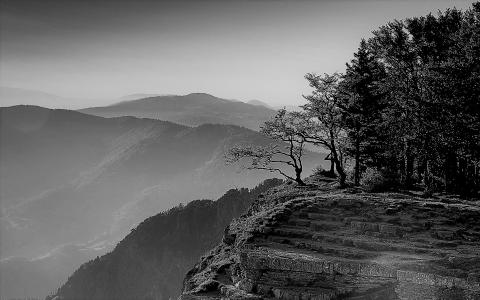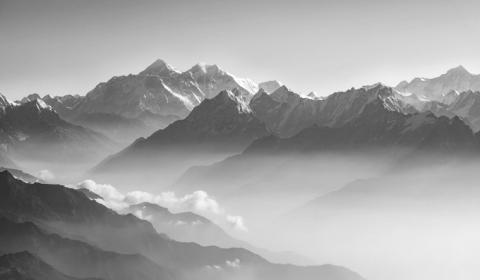
DVG was a person of the people. His spectrum of contacts extended between the extremes of traditional scholars and true-blue Marxists. Long-standing interaction with a wide variety of people had provided him a window into the recesses of social life that usually remain unnoticed. His prodigious learning in political philosophy and statecraft contributed to his insight into world affairs. All this put together enabled him to see communism for...

DVG’s exposition of the philosophical footing of citizenship allures us by its timeless fragrance. Hearing him speak on this subject is like lending our ears to Bhagavan Chanakya, Svami Vidyaranya, or Svami Vivekananda:
According to the religion of the Vedanta, the highest felicity of man on earth is to attain to a full and steadfast vision of the spirit of the universe (Brahman). He should wear out the narrow blinkers of his ordinary...

Volume Five (1949–1952) [1]
DVG was an ardent devotee of literature. He laid great emphasis on the study of classics. After founding the Gokhale Institute of Public Affairs, he formed a weekly study circle to promote the study of classics in various genres and disciplines such as poetry, culture, history, economics, political science, and philosophy. Plato’s Dialogues was among the first batch of such classics. Socrates and Plato had an enduring...

M Venkatakrishnaiya (1844–1933) was popularly known as the ‘Grand Old Man’ of Mysore. He was a veteran journalist, educationalist, and builder of institutions. The Mysore State owed a great chunk of its development to his zeal and perseverance. DVG wrote a tribute to him in 1932. Assessing the importance of Venkatakrishnaiya’s work, he outlined the nature of public work in India:
… Public work in our country then was, even if it now is not,...

Volume Four (1929–1946)
In 1931, DVG brought together his considered views on the problem of the Native States in a monograph titled The States and their People in the Indian Constitution. The book drew acclaim from reputed periodicals such as Bombay Chronicle, People, Hindustan Times, Servant of India, and Triveni. Eminent publicists such as A B Keith, C F Andrews, Alladi Krishnaswamy Iyer, and P L Chudgar considered it a tour-de...

DVG’s assessment of the social milieu in South India before the fourteenth century ce requires mention:
The atmosphere was then one of unsophisticated faith. No alien civilization had invaded the land to disturb the old social order. No new economic developments had come about to unsettle the people’s adherence to traditional modes and ideals of living. Even Buddhism had attacked only dogma and ritual, and not the ethical and social sides of...

Volume Three (1923–1927)
DVG congratulated the Hindu Mahasabha on its attempt to consolidate our community. He explained the salience of the endeavour and the perils of neglecting it:
When Mahomedans and Parsis and Christians are developing a vivid sense of religious community, the avoidance of that sense by Hindus alone would be clearly suicidal. Further, the Sanghatan movement, by fusing the narrower prejudices of caste and...

Volume Two (1917–1922)
Journalism today has mostly been reduced to a racy reportage of colourful caprices, half-truths, and open propaganda. These were the precise journalistic evils DVG repeatedly warned against. His standards were exacting, and he made sure that he practised what he preached. His essays and editorials in The Karnataka unceasingly celebrated enduring values such as gratitude, trustworthiness, independence,...

The problem of the Indian Native States occupied DVG’s mind for over three decades (1915 to 1945). Before independence, our country comprised two parts: 1. British India consisting of provinces under direct British rule, 2. Native States ruled by Indian Princes. The struggle for freedom was largely confined to British India during the early years of the twentieth century. The champions of independence, fearing unnecessary delay and complication...

DVG – These three letters evoke an image of a wise old man laughing a toothless laugh in the minds of the Kannada-speaking people. We are so accustomed to this image that any reference to a youthful DVG sounds and seems odd. We are startled by discovering that the author of Maṅkutimmana Kagga—a collection of verses capturing meditations on life in a “semi-philosophical vein”—wrote in English, mostly on such topics that resolutely maintain their...
